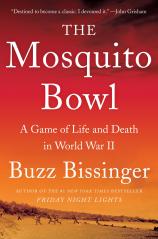The Mosquito Bowl: A Game of Life and Death in World War II
Review
The Mosquito Bowl: A Game of Life and Death in World War II
As I was preparing to read and review THE MOSQUITO BOWL, I researched Buzz Bissinger’s body of work. I thought I was familiar with his writing as the author of well-known sports books during a four-decade career. Football fans recognize FRIDAY NIGHT LIGHTS as a sports classic. Almost every football coach I know has read Bissinger’s account of high school football in Permian, Texas. Ranked by Sports Illustrated as the fourth best sports book ever written, it served as the basis for a movie and a television series that even today has passionate followers.
However, I learned that there is more to Bissinger than writing about sports. Awarded the Pulitzer Prize for pieces he wrote on Philadelphia courtroom corruption, Bissinger has covered figures as varied as Caitlyn Jenner, Stephen Glass and Tony La Russa. Many of his books and articles are the result of his immersion journalist approach, in which readers become part of the ongoing story. While THE MOSQUITO BOWL is seemingly about an ersatz football game, there is far more here than what occurred on a dirt and coral field on an island in the Pacific in 1944.
"While THE MOSQUITO BOWL is seemingly about an ersatz football game, there is far more here than what occurred on a dirt and coral field on an island in the Pacific in 1944."
This is not a book that will take you into the huddle or locker room and provide volumes of material on football. In fact, discussions of the sport are minimal. The Mosquito Bowl game itself goes by so quickly that you might even miss it. The story presented here is of America at war, planning and preparing for one of the bloodiest battles in US history. Along the way, soldiers from the 4th and 29th Marine regiments found a moment to divert their attention to a football game. The intersection of sports and patriotism is long-standing in American history. During World War II, many of the nation’s finest athletes fought in a battle against fascism and tyranny. Sometimes they could take a break from the war to briefly play the game they loved. They were men at war, but the call once again to be boys on the field was too alluring to avoid.
Participants in the Mosquito Bowl Game included an All-American running back from Purdue and others from Cornell, Notre Dame and Illinois. Another player had been an All-American receiver at Wisconsin, and one had started for the New York Giants. Beyond their football careers, they shared a patriotic spirit that brought them to a Marine combat division. Many who played in the game were in their mid-20s and had been molded into Marine officers to lead younger men still in their teens into battle. Some had enlisted shortly after the attack on Pearl Harbor. They had fought their way across the Pacific and were now preparing for a landing on Okinawa, and perhaps an invasion of Japan.
Sixty-five marines suited up for the game. Football uniforms were not part of the issued military gear, so the men wore cut-off dungarees, shorts and marine field shoes. Fifteen hundred fellow marines watched the teams battle to a 0-0 tie. The game itself was long forgotten until Bissinger discovered details in his research of Okinawa.
The Battle of Okinawa occupies the concluding portions of THE MOSQUITO BOWL. Fifteen of the 65 players died, and 20 were wounded. It was the largest number of American athletes to perish in a single battle. The struggle on Okinawa was exacerbated by Japanese tactics that had been shaped after military successes across Pacific islands. The Japanese maintained their belief that they could frustrate American military efforts and somehow still achieve more favorable terms than unconditional surrender.
Bissinger concludes his stirring history with a recognition that the phrase “The Greatest Generation” has become a tired bromide: “There still is far too much misogyny and racism and hatred of the Other in the United States for any generation to be great. But what made the marines special was how they were ordinary men who rose to extraordinary circumstances time and time again. It is the true measure of greatness that most of us never achieve.”
Reviewed by Stuart Shiffman on September 16, 2022
The Mosquito Bowl: A Game of Life and Death in World War II
- Publication Date: September 12, 2023
- Genres: History, Nonfiction
- Paperback: 496 pages
- Publisher: Harper Perennial
- ISBN-10: 0062879936
- ISBN-13: 9780062879936




